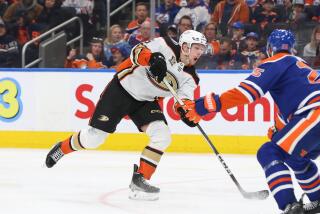Mighty Ducks ‘95-’96 : Sitting Pretty : Mighty Ducks Continue to Be a Hot Ticket in Southland
How tough a ticket are the Mighty Ducks?
Tough enough that 20-odd years of friendship with Bill Holford, director of sales and marketing for the team, won’t get you complimentary seats if you call to chat.
Tough enough that even if you work for the team, you might have to take turns using the department’s free tickets. Tough enough that when you get them, you might be embarrassed because you’re sitting in the upper deck.
Tough enough that if you’re playing in the game and have a family of four, you get two free tickets and have to buy the other two.
And if you don’t have a connection?
Must you stand in line, sit on hold, pay through the nose or settle for games other than the ones you really wanted?
Not necessarily. But after 49 consecutive sellouts, you should plan ahead. Only 1,500-2,000 tickets a game are available at the 17,174-seat Pond of Anaheim after accounting for the roughly 12,000 season tickets, plus mini-plan packages, suite and club seating.
That doesn’t mean you have to go to The Pond box office at 7 a.m. the morning single-game tickets first go on sale in September. This season, not a single game sold out during the first weekend of sales.
In 1993, before the Ducks had played a game, they sold 12,000 tickets the first day. Last year, with a labor dispute about to postpone the season, they sold more than 20,000 the first day. This year, that dropped off 25% to about 15,000.
The Ducks have spent so much effort promoting their tickets as a rare and precious commodity that now they’re wondering if they haven’t convinced people that there are none to be had.
“Even though we have sellouts, we promote ticket sales so people are still trying to get those tickets, pushing to get those tickets,” Holford said.
But when the home opener, the three Kings’ games, the Boston, Pittsburgh and New York Ranger games didn’t immediately sell out, it gave the front office pause. Not that this qualifies as a crisis--how many teams even think of selling out the season? It may be that the Ducks will still sell out, just not as far before game time.
“That myth exists that we’re sold out and people sometimes shy away,” said Bill Robertson, director of public relations for the Ducks. “There are going to be some people who say [rising ticket prices are a factor]. Some are going to say that the novelty is wearing off. What we have to do is make sure we still provide a good environment, good entertainment and there has to be a good entertainment value on the ice too.”
Tony Tavares, Disney Sports Enterprises president, wonders if the Ducks have “enough sizzle” going into their third season, but discounts the issue of ticket prices, which increased another 7.9% after last season after going up 10.6% the year before.
“We’ve had a bunch of sellouts here in a row, and the first time we don’t sell out a game, I guarantee you there will be an article written somewhere saying it’s all price resistance,” Tavares said. “The fact of the matter is that sooner or later we won’t sell out a game and it won’t be because of price resistance, it will probably be more because of team performance. It’s going to become much more of a factor as we go along.”
As for why it’s so hard to get Ducks tickets when you work for the Ducks--or your neighbor or aunt or golf partner does--that’s easy. It’s about maximizing revenue.
“We as an organization are not frivolous on comps,” Holford said. “Because we have high demand, they’re that much more valuable. We have limited capacity. We’re not a theme park. We have 17,174 tickets and we go to great lengths to sell every one of those.”
On a given night, there are perhaps 200 complimentary tickets in the building--including tickets distributed to players and employees. By contrast, there might be 1,500 complimentary tickets distributed for an Angels’ game, where the crowd is often less than twice as large as the one at a Duck game--although with 64,593 seats in Anaheim Stadium, it isn’t as if there aren’t plenty of seats available.
If you meet Randy Ladouceur and he doesn’t offer you tickets, realize this: He has to buy them. The NHL collective-bargaining agreement calls for each player to receive two free tickets at home. On the road, they buy. “As far as tickets flying around, that doesn’t really happen,” said ticket manager Don Boudreau. “We don’t have a lot of seats to give away. We’ll sell everything if we can.”
More to Read
Go beyond the scoreboard
Get the latest on L.A.'s teams in the daily Sports Report newsletter.
You may occasionally receive promotional content from the Los Angeles Times.






